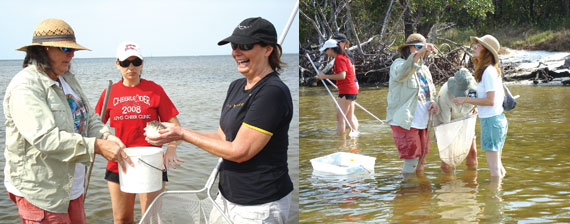 Photo left: Monica Dorken is ready with a bucket as Susan Harris, Hill-Gustat Middle School seventh- and eighth-grade teacher, holds a puffer fish she captured during their wading tour as Liz Abell, Sun ’n Lake Elementary fourth-grade teacher, looks on. Photo right: Monica Dorken, Charlotte Harbor Environmental Center educator/program coordinator, checks to see what Dorothea Strickland, K–12 science resource teacher, caught in her net.
Photo left: Monica Dorken is ready with a bucket as Susan Harris, Hill-Gustat Middle School seventh- and eighth-grade teacher, holds a puffer fish she captured during their wading tour as Liz Abell, Sun ’n Lake Elementary fourth-grade teacher, looks on. Photo right: Monica Dorken, Charlotte Harbor Environmental Center educator/program coordinator, checks to see what Dorothea Strickland, K–12 science resource teacher, caught in her net.
Highlands County teachers and administrators got their feet wet this April exploring the Charlotte Harbor estuary during a wading tour that was part of a two-day excursion.
The goal of the trip, which was organized by Dorothea Strickland, Highlands County K–12 science resource teacher, was to provide hands-on learning opportunities and knowledge that teachers can use in their classrooms.
“Science workshops for teachers are rare so I was thrilled to take part,” said Susan Harris, a seventh- and eighth-grade teacher at Hill-Gustat Middle School. “If a teacher is excited about a subject, that excitement will spread to the students.”
Jacquelyn Maibach, a fifth-grade teacher at Cracker Trail Elementary School, says that reading about something isn’t enough to get kids excited about it. She plans to use her photos, discussions and gathered materials to spark her students’ interest in learning about their environment.
Elena Wirick-Velez, a teacher at the Kindergarten Learning Center, also planned to immediately share the knowledge she gained on the trip with her students.
“Next week we will study water conservation and how the environment is impacted,” said Wirick-Velez. “I plan to share photos and information from this trip with my students as well as my peers.”
Rebecca Fleck, Highlands County assistant superintendent of curriculum and instruction, also found the trip to be a beneficial experience.
“I wanted to increase my personal awareness of the resources available to our instructional staff and students,” said Fleck. “This enables me to direct resources where they are most beneficial and effective.”
The field study, which included a watershed discussion led by a Charlotte Harbor Environmental Center scientist and a boat tour on the Peace River to conduct water quality monitoring tests, provided teachers with an overview of water resources issues in the Peace River Basin.
This teacher training workshop was funded by the District.
In addition to teacher training, the District offers speakers for classroom presentations and free educational materials. The publications are correlated to Florida’s Sunshine State Standards and can also be ordered on the District’s web site at WaterMatters.org/publications.
